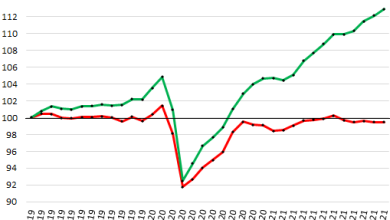Turkey’s inflation surges to 54%, highest in 20 years

ISTANBUL, March 3 (Reuters) – Turkey’s annual inflation jumped more than expected to a two-decade high of 54.4% in February, fuelled by a crash in the lira last year and soaring commodity prices that are expected to climb higher due to Russia’s invasion of Ukraine.
Month-on-month, consumer prices rose 4.8% in February, the Turkish Statistical Institute said on Thursday, compared to a Reuters poll forecast of 3.8% and an annual forecast of 53%.
The producer price index soared 7.22% month-on-month in February for an annual rise of 105%, reflecting the rise in commodity prices amid Russia-Ukraine tensions.
Register now for FREE unlimited access to Reuters.com
Inflation has soared in the last nine months as Turkey’s central bank, under pressure from President Tayyip Erdogan, slashed interest rates by 500 basis points last year. It is expected to rise further, exacerbated by a surge in gas, oil and grains prices set off by the Ukraine conflict.
The easing cycle led to a currency crisis that saw the lira fall 44% against the dollar last year, raising inflation via imports priced in hard currencies.
The unorthodox cuts were part of Erdogan’s new economic programme that prioritised growth, investment and exports while keeping rates low.
Economists say rate hikes are off the cards, despite deeply negative real yields, given Erdogan’s aversion of high rates. They expect authorities to respond through interventions in the forex market to keep the lira stable, and fiscal measures.
Last month’s inflation was driven by food and non-alcoholic drink prices, which rose 8.41% month-on-month, while furniture prices rose 7.00%, further eroding household savings.
Annually, transportation prices surged 76%, while furniture prices rose 65%, data showed.
Inflation will stay close to February levels until the last months of the year, said Jason Tuvey, senior EM economist at Capital Economics.
“The spillover effects from the Russia-Ukraine crisis, including higher global commodity prices and potentially fresh supply chain disruptions, mean that the risks are skewed to the upside,” he said in a note.
“DIFFICULT PERIOD”
After hiking prices across the board at the start of the year, the government has implemented tax cuts on basic goods and is subsidising a significant amount of electricity bills, in an effort to soften the impact on households.
The central bank said in January it expects inflation to peak around May, when it is seen rising to around 55%, but Russia’s invasion has raised the prospect of even higher inflation.
A Turkish official said upward risks on inflation were growing and energy prices would continue to put pressure on prices. “There is a picture before us that is straining the balance of the economy. Adding in the Fed’s future decision, it is clear that it will be a difficult period,” the official said.
The lira weakened beyond 14.0 to the dollar last week after Russia launched its offensive, and further depreciation risks adding more pressure on prices.
The currency was little changed after inflation data on Thursday, standing at 14.1325 against the dollar at 0808 GMT.
While the central bank expects inflation to fall to 23.2% by the end of the year, economists’ expectations are much higher, with the median estimate at 38% in a recent Reuters poll.
Register now for FREE unlimited access to Reuters.com
Additional reporting by Orhan Coskun, Halilcan Soran and Oben Mumcuoglu; Editing by Dominic Evans and Ece Toksabay
Our Standards: The Thomson Reuters Trust Principles.
Source link





